PGY1s
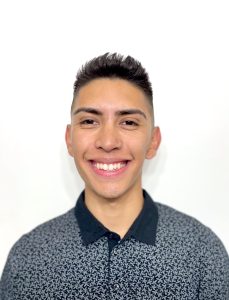 Carlos Escutia Rosas, MD
Carlos Escutia Rosas, MD
Hometown: Lynnwood, WA
Undergraduate College: University of Washington
Medical School: Rush Medical College
Why did you choose UW Psychiatry?
I grew up in the Seattle area, and returning to UW allows me to serve the communities that shaped me. I was especially drawn to the program’s strengths in child and adolescent psychiatry, LGBTQ+ mental health, and its focus on underserved populations across Washington. I also missed being surrounded by nature and always knew I’d eventually come back for that reason.
Career Goals
I plan to pursue child and adolescent psychiatry with a focus on LGBTQ+ youth, immigrant families, and undocumented communities. As someone with lived experience navigating the mental health impact of legal vulnerability, I think a lot about how changes in immigration policy affect people’s sense of safety, belonging, and stability. I hope to develop models of care that are trauma-informed, culturally responsive, and grounded in advocacy. Long-term, I want to contribute to efforts that expand access to mental health care regardless of immigration status.
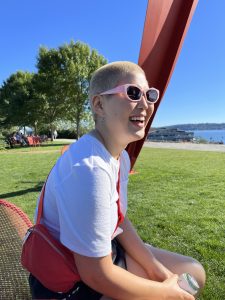 Sarah Batbold, MD
Sarah Batbold, MD
Hometown: Queens, New York
Undergraduate College: New York University Abu Dhabi
Medical School: Mayo Clinic Alix School of Medicine
Why did you choose UW Psychiatry?
The authentic, values-driven conversations I was able to have during my UW interview day gave me confidence that I would be able to build a really wonderful community at this residency. Seattle is such a dynamic, open-minded, and somehow still down-to-earth place, and the program at UW reflects that in many ways – from the diverse intersections of identity represented in our resident cohorts to the innovative research and QI work our department is known for nationally.
Career Goals
At this point, I’m pretty sure I’d like to be an adult psychiatrist, and find myself consistently drawn to topics of addiction, intercultural psychiatry, incarceration, and LGBTQIA+ identity. Forensic or Addiction fellowship may be in my future!
Clinical Rotations
- 5 months of Harborview inpatient psychiatry
- 1 month VA psychiatry
- 1 month R1 Risk
- 1 month Harborview internal medicine
- 2 months VA internal medicine
- 1 month UW neurology
- 1 month VA neurology
- 1 month Harborview emergency room
How many hours on average do you work each week?
So far, an average week has been about 45-50 hours in the hospital.
How often do you work nights and weekends?
In my first month at Harborview, I’ve been assigned 1 short-call shift (which is where you arrive at the normal time in the morning and stay until 8pm), as well as 1 overnight call shift (where I had an excellent 3rd year resident trainer by my side all night and even managed to get a little sleep).
Sunday
Morning and Afternoon: Brunch with my sisters (who now both live in Seattle!) to gab and recharge / potentially get into an argument / occasionally practice relational repair. Never a dull moment with them.
Evening: Ramble through the GORGEOUS public UW Arboretum with my girlfriend and our sweet 1-year-old dog, Tova.
Monday
Morning and Afternoon: I take the bus to Harborview where I arrive to the resident workroom around 7am, get sign-out on my patients from the overnight resident, and chart review for about an hour. At 8am, I join my attending (+/- a medical student or two) and head to multidisciplinary team meeting with members of our unit’s incredible nursing, social work, occupational therapy, and pharmacy staff. After meeting, we interview patients and usually finish up rounding by 11am. From 11-12, I plug in medication orders, call consults, grab an ice coffee from the Maleng cafe, and get started on some progress notes. On Mondays from noon-1pm we have inpatient didactics (with lunch provided), and so far, these teaching sessions have centered on topics relevant to new interns, such as how to respond to medical emergencies on the psychiatric unit or a panel discussion featuring our allied mental health colleagues. Afterward, I finish up on notes, go back to see specific patients I’d like to gather more information on / practice some therapeutic listening with, and generally interrupt my coresidents’ workflow with random chatter. I usually finish up my to-do’s and sign out to the short call resident sometime between 3 and 6pm depending on the day, and then head out for the evening!
Evening: Go sit out on the T-dock at Lake Washington with my sister to laugh a bunch and admire Mt. Rainier.
Tuesday
Morning and Afternoon: Harborview workflow (see Monday). On Tuesdays at noon we have another weekly hour of didactics with our super supportive inpatient chiefs, Alexis and Kathy.
Evening: Camp out with my laptop, notebook, and a slushy at Stoup Brewing to do some much-needed work/life personal admin tasks.
Wednesday
Morning and Afternoon: Harborview workflow 🙂
Evening: High likelihood of seeking out delicious, affordable Mexican at Tacos Chukis after work. High likelihood of enjoying the aforementioned while rewatching multiple episodes of Vanderpump on the couch.
Thursday
Morning and Afternoon: Harborview in the morning, and then head out by 11am so I can make it to UW Northwest Hospital by noon for provided lunch and an afternoon of didactics. There’s a very reasonable policy in place that residents don’t write more than two progress notes on Thursdays so our afternoon is freed up for learning. Most recent Thursday lecture was on the Psychopathology and Differential Diagnosis of Psychotic Disorders by Dr. Black. I laughed, I cried, I felt grateful to be learning amongst such thoughtful psychiatrist educators.
Evening: Attend a free reading or talk at Elliott Bay Book Company – an epic and beautiful local, independent bookshop. Earlier this summer, I saw one of my favorite fiction writers of all time. This past week, there was an amazing discussion addressing mass incarceration and the rights of incarcerated individuals.
Friday
Morning and Afternoon: Harborview!
Evening: Movie night at home vs queer dance party in the city (especially last month when Seattle was simply the best and gayest ever during Pride month).
Saturday
Morning and Afternoon: Get up, walk the dog, and go for a quick swim in Lake Washington alongside an awesome group of locals who gather every Saturday morning – all year round – to jump in the water and share some chai <3.
Evening: Chores, errands, and a dinner out with my girlfriend. The food scene here is simply *chef’s kiss*.
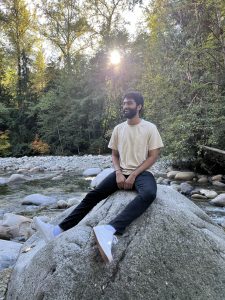
Mahtab Brar, MD
Hometown: Seattle, WA
Undergraduate College: Oregon State University
Medical School: Oregon Health and Sciences University
Why did you choose UW Psychiatry?
I always wanted to come back home to Washington after completing my medical training, so doing my training in Washington was only natural. While geography certainly played a role in my decision, it was my interactions with the people in the program that pushed UW over the top for me. The warm, welcoming, and diverse cast of residents and faculty made UW a very appealing environment for me. Additionally, you can’t go wrong with the endless amounts of food, hiking, soccer, and activities available in Seattle.
Career Goals
The only certain part of my career goals for now are the desire to practice in a more rural locale. Otherwise my career interests are constantly in flux and at this point all I know is that I made the right choice in pursuing psychiatry.
PGY2s
Jason Finkbonner, MD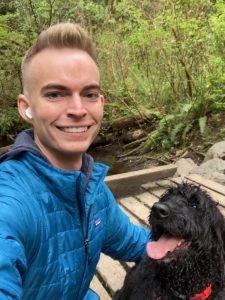
Hometown: Lummi Reservation, Bellingham, WA
Undergraduate College: Western Washington University
Medical School: University of Washington
Why did you choose UW Psychiatry?
UW has the best opportunities for working with and training in indigenous communities that were just unparalleled by other programs. The experiences UW offers across the psychiatry spectrum give us the freedom to find our niche in very supportive learning environment. Seattle is a great city in a beautiful region with so much nature to explore. Our cohort is full of fantastic people that have been fun and supportive as we’ve gone through training and the large class size makes our call schedules very manageable.
Career Goals
I’m really liking trying out all the areas of psych that we cover in training. My long-term goal has always been to work with Native American communities after finishing residency. I’d also like to incorporate some components of inpatient, interventional, and private practice into my future work. What I’ve learned from my attendings is that many psychiatrists change and evolve their practice over the course of their long careers.
Clinical Rotations
- 1 month each of: inpatient geriatrics at NWH, inpatient pediatrics at SCH, PES at HMC
- Multiple months of: adult inpatient HMC, consults UW/HMC/VA, night float UW/VA, risk (1 week), float (1 week)
How many hours on average do you work each week?
Definitely varies by rotation but on average, 40-50 hours/week
How often do you work nights and weekends?
Maybe one 12-hour call shift per month, more if I’m on night float
Sunday
Morning and Afternoon: Usually sleeping in, doing some laundry and yard work, might hang with some friends or see/call family
Evening: Drive back to Seattle and get things ready for work on Monday.
Monday
Morning and Afternoon: Wake up 0630 and at work getting signout by 0730 (or 0830 depending on rotation). Chart review and round with patients until 1200, then orders, meeting, admin things; hopefully singnout by 1630.
Evening: Gym, errands (Costco??), dinner and walk with my partner. Try to be in bed by 2230.
Tuesday
Morning and Afternoon: Looks the same as Monday with the addition of a zoom meeting with my off-ward supervisor.
Evening: Looks like Monday, maybe a friend comes over for dinner or we go out.
Wednesday
Morning and Afternoon: At work until around 1100 doing what time allows and in a few weeks we will start seeing our first therapy patients in the afternoons.
Evening: Don’t have to be up as early on Thursdays so if it’s nice I might go paddle boarding with my partner or we might spend the evening reading after dinner. Otherwise, I try to make it to the gym or do something active. Probably end the night with watching some TV.
Thursday
Morning and Afternoon: Depends on what block I’m on. Sometimes there is admin time in the morning before didactics, otherwise same as the other weekdays but leaving work at 1100 to go to didactics. Arrive at NWH by 12/1230 for didactics until 1700.
Evening: There’s usually always a group going to happy hour after didactics so I may or may not do that depending on what else I have going on. Get home by 1900, dinner, and maybe a walk.
Friday
Morning and Afternoon: About the same as Monday and Tuesday
Evening: My partner and I spend a lot of our weekends out of town, often to Bellingham, so we usually drive to where we’re going Friday evenings. Maybe get some food or drinks if we’re up for it.
Saturday
Morning and Afternoon: Sometimes a call shift, but not very often. Usually, I try to get to a class at the gym at 0830, then coffee, and probably some chores around the house. In the summer we would probably be paddle boarding at the lake or on our friends’ boat.
Evening: Usually see some friends or just chill at home.
PGY3s
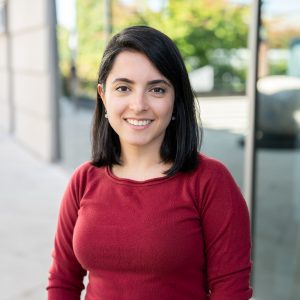 Farzaneh Farhadi, MD
Farzaneh Farhadi, MD
Hometown : Tehran, Iran
Undergraduate College and Medical School: Iran University of Medical Sciences, Tehran, Iran
Why did you choose UW Psychiatry?
I decided to pursue a psychiatry residency because I am passionate about improving the quality of life. Among all my medical school rotations, psychiatry was the one I enjoyed the most. I wanted to train in a program that could nurture this interest and provide a variety of opportunities, allowing me to work with diverse care teams and patient populations. I have a deep love for teaching and wanted to be part of a program that offered teaching opportunities. As an IMG, an inclusive environment was also important to me. The fact that UW is like a big family of psychiatry residents was another appealing aspect. I admire how large and diverse each class is while still being warm and welcoming. Additionally, I hoped to learn and practice neuromodulation, psychotherapy, mental health justice, and leadership during my residency, and UW offers all these and more. Last but not least, I found Seattle to be a fantastic city to live in, with nature providing an abundance of blessings within minutes to a couple of hours of driving.
Career Goals
At this point, I am still deciding on my specific career path. I believe my R3 year will be a valuable experience, exposing me to different rotations where I can discover my primary interests. As of now, I find myself intrigued by every psychiatry rotation I’ve undertaken so far!
Clinical Rotations
- Monday: UW Outpatient Continuity Clinic (OPC)
- Tuesday: Seattle Children’s Autism Center
- Wednesday: UW Outpatient Clinic (OPC), Supervision
- Thursday: Didactics, Supervision–no clinical duties
- Friday: Harborview Addiction Clinic
How many hours on average do you work each week?
40 hours
How often do you work nights and weekends?
Night and weekend shifts are mostly training call shifts with interns. About 7 shifts every 6 months.
Sunday
Daytime: Sleep in, enjoy a lazy morning or go on a hike or brunch, do some grocery shopping, chores at home
Evening: Relax, dinner, prepare for the week
Monday
Morning: Head to OPC to see my patients, DBT seminar at noon, and more patients in the afternoon
Evening: Head home (if not home already in case visits were all virtual) and relax or work out
Tuesday
Morning and Afternoon: Seattle Children’s Autism Clinic, supervision with the attending in the afternoon
Evening: Doing an outdoor activity or relax and read the book for the book club with co-residents
Wednesday
Morning: OPC clinic and discussing patients at CLS with co-residents and the attending, supervision in the afternoon and working on a scholarly project
Evening: Relaxing at home or work out
Thursday
Morning and Afternoon: Didactics and supervision
Evening: Do a short walk or catch up with co-residents
Friday
Morning and Afternoon: HMC Addiction Clinic
Evening: All the fun stuff!
Saturday
Morning: Video call home and chat with family, hang out with friends or explore the city and get some pastries at Petit Pierre
Afternoon and Evening: Watch a movie, catch up with friends, or go for a bike ride
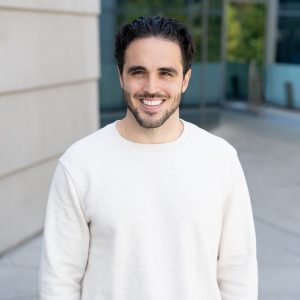
Joey Mazzola, MD
Undergraduate College and Medical School: University of California, Davis
Why did you choose UW Psychiatry?
World-class reputation, countless career opportunities and a vibrant city full of fun activities. I could not ask for more in a program. Another contributing factor to my decision to train at UW was the opportunity to work with and learn from a large and diverse residency class (none of my co-residents have the same area code!).
Career Goals
My career goals are constantly evolving (I love everything UW psych throws my way), but as of now I envision finishing child and adolescent fellowship then mixing in some CL/ interventional psychiatry work. Maybe dabble in some locums for a year or two after I finish my training as well 🙂
Clinical Rotations
- Monday: VA Outpatient Psychiatry Clinic- follow-ups
- Tuesday: THIRA (intensive outpatient and eating disorders center in Belluvue, WA)
- Wednesday: VA Outpatient Psychiatry Clinic- intakes + follow-ups
- Thursday: Didactics, Supervision–no clinical duties
- Friday: VA Addiction Treatment Center
How many hours on average do you work each week?
About 40 hours per week
How often do you work nights and weekends?
Around 7 shifts per half-year
Sunday
Morning, Afternoon, and Evening: Sleep in just like Saturday J , Costco or TJ run, be lazy all day, catch up with family/ friends, decompress before the week starts
Monday
Morning and Afternoon: wake up, stretch, practice the piano, make breakfast, walk to the VA for clinic, start seeing patients for medication management, then drive to Harborview hospital for my outpatient geriatric clinic
Evening: head to the gym after clinic, go home and cooks some food, decompress with some reading or TV
Tuesday
Morning and Afternoon: wake up, stretch, practice the piano, drive to Bellevue for a full day of clinic at a partial hospitalization/ residential program the specializes in treating eating disorders and folks with borderline personality disorder
Evening: drive back to Seattle, head to the gym, cook some food, do some prep for my Wednesday clinic.
Wednesday
Morning and Afternoon: wake up, stretch, practice the piano, prepare breakfast and walk to the VA, see follow up patients for medication management, see an intake, and then see CBT patients in the afternoon, followed by supervision where I staff all of my VA clinic patients with an attending
Evening: go to the hospital gym, walk home, cook dinner and decompress
Thursday
Morning and Afternoon: wake up, stretch, drive to NorthWest hospital for didactics, then my personal therapy in the afternoon followed by CBT seminar
Evening: go home or go to the beach/ walk around Greenlake OR paddle board if the weather is good J
Friday
Morning and Afternoon: wake up, stretch, practice the piano, prepare breakfast then walk to the VA, see patients in the Addiction Treatment Center
Evening: gym and go out to eat with friends. I usually get some ice cream or go dancing.
Saturday
Morning and Afternoon: Sleep in! Stretch, go to a local coffee shop, do some reading, then depending on the weather go to lake Washington or Seward park, nap optional
Evening: go out with friends in the evening
PGY4s
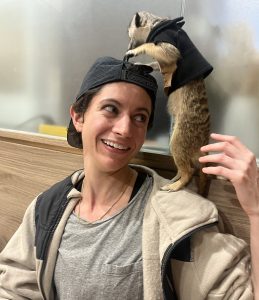 Tony Pasik, MD
Tony Pasik, MD
Chief Resident for Recruitment
Hometown: New York, NY
Undergraduate College: Barnard College
Medical School: Icahn School of Medicine at Mount Sinai
Why did you choose UW Psychiatry?
I chose this program because of its commitment to progressive thinking and its warm resident body. When I interviewed, it seemed that the residents here are tending to a beautiful culture of collaboration, authenticity, and dedication to growth — an assessment that proved to be a spot on. Social and health justice are a priority to me, and its refreshing to be at an institution that aligns with my values and have comradery in this mission.
Academically, I wanted to have robust psychotherapy training. UW is the birthplace of DBT, and additionally has broad psychotherapy training including psychodynamic, CBT, ACT, couples therapy, and more — with excellent supervisors in each area.
I would be remiss not to include that I also chose this program because of a calling from the trees. The nature of cascadia is magically healing, and it makes sense to me to study mental healthcare in this setting. I recently moved to a cabin in the mountains to make sure I take in as much of her grandeur as possible.
And in the midst of this awesome nature, the city of Seattle is one of the most gender-diverse cities in the country. As a genderqueer creature, it’s important to me to live among my community; I love walking around this city seeing people’s gorgeously creative gender expressions.
Career Goals
My clearest career goal is to stay involved in health justice and advocacy. My other career goals are fluid, as with much of myself. And that’s part of why I love this program and field — there’s freedom to explore and great support to pursue a variety of pathways. In whatever area I pursue, I do plan to incorporate psychotherapy. I also want to travel, so I’ll likely check out locums.
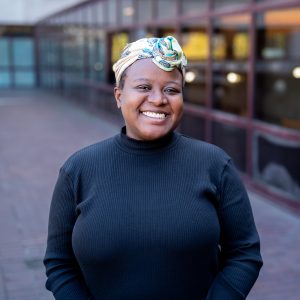 Claire Oduwo, MD
Claire Oduwo, MD
Undergraduate College: University of Nebraska-Omaha
Medical School: University of Nebraska Medical Center
Why did you choose UW Psychiatry?
I chose UW because I wanted to go to a large residency where I would have the chance to meet many peers and mentors to enhance my residency experience. UW also has multiple clinical locations that serve diverse populations that I was interested in working with. I also fell in love with the beauty of Seattle and the PNW which was a pleasant bonus after spending most of my life in the Midwest!
Career Goals
I am hoping to work in a community setting with underserved populations. I am also thinking about pursuing a fellowship in Forensic Psychiatry. I am involved in our resident union RFPU-NW/CIR and I hope to continue working in advocacy to improve physician working conditions.
Clinical Rotations
- Outpatient Psychiatry Clinic (OPC)
- Pain Psychiatry
ECT - Population Health Elective
- VA Mental Health and Justice
How many hours on average do you work each week?
40 hours
How often do you work nights and weekends?
Night and weekend shifts are mostly training call shifts with interns and new R2 residents. About 3 shifts every 6 months.
Sunday
Daytime: I like to spend time outside, going on walks, grocery shopping, and preparing meals for the week. I also hang out with my kitty Mango!!
Evening: I review patients and complete relevant readings for cases over the next week. I also catch up on emails and make a schedule for the week.
Monday
Morning and afternoon: I spend the morning completing activities for the Population Health rotation. Afternoons are spent at the Pain Psychiatry clinic where I perform evaluations for patients with chronic pain and collaborate with other health care providers to create treatment plans.
Evening: I finish notes from the day, go to the gym, eat dinner, and watch my favorite reality TV show of the season. Some weeks, I attend our resident union meetings.
Tuesday
Morning and afternoon: I spend a full day at my continuity clinic at the Outpatient Psychiatry Clinic (OPC). Some of the time is spent at home doing telehealth.
Evening: I finish notes from the day, go to the gym, and eat dinner.
Wednesday
Morning and afternoon: This is my chief admin day. I respond to emails, send reminder emails about call shifts and policies, and attend meetings with the program director and associate program directors.
Evening: I complete readings from clinics and other papers, go to the gym, and then eat dinner.
Thursday
Morning and afternoon: I spend the morning in didactics including attending T group and Noon Rapport. The afternoon is more call chief admin time. I also spend time in supervision for my psychotherapy cases and my personal psychotherapy.
Evening: I spend the evening relaxing, watching TV and movies, and eat dinner.
Friday
Morning and afternoon: I spend the morning doing ECT, TMS, and ketamine infusions. The afternoons are spent in my VA Mental Health and Justice rotation which is focused on learning about topics in forensic psychiatry.
Evening: I spend most evenings relaxing at home and making a nice meal. Sometimes I meet up with friends in town for dinner or watch the sunset at a park.
Saturday
Daytime: Sleep in then I make myself a nice breakfast. I go for a walk on the waterfront in downtown Seattle. Sometimes, I take a day trip to explore nature outside of Seattle.
Evening: Go out to dinner or a show with friends.